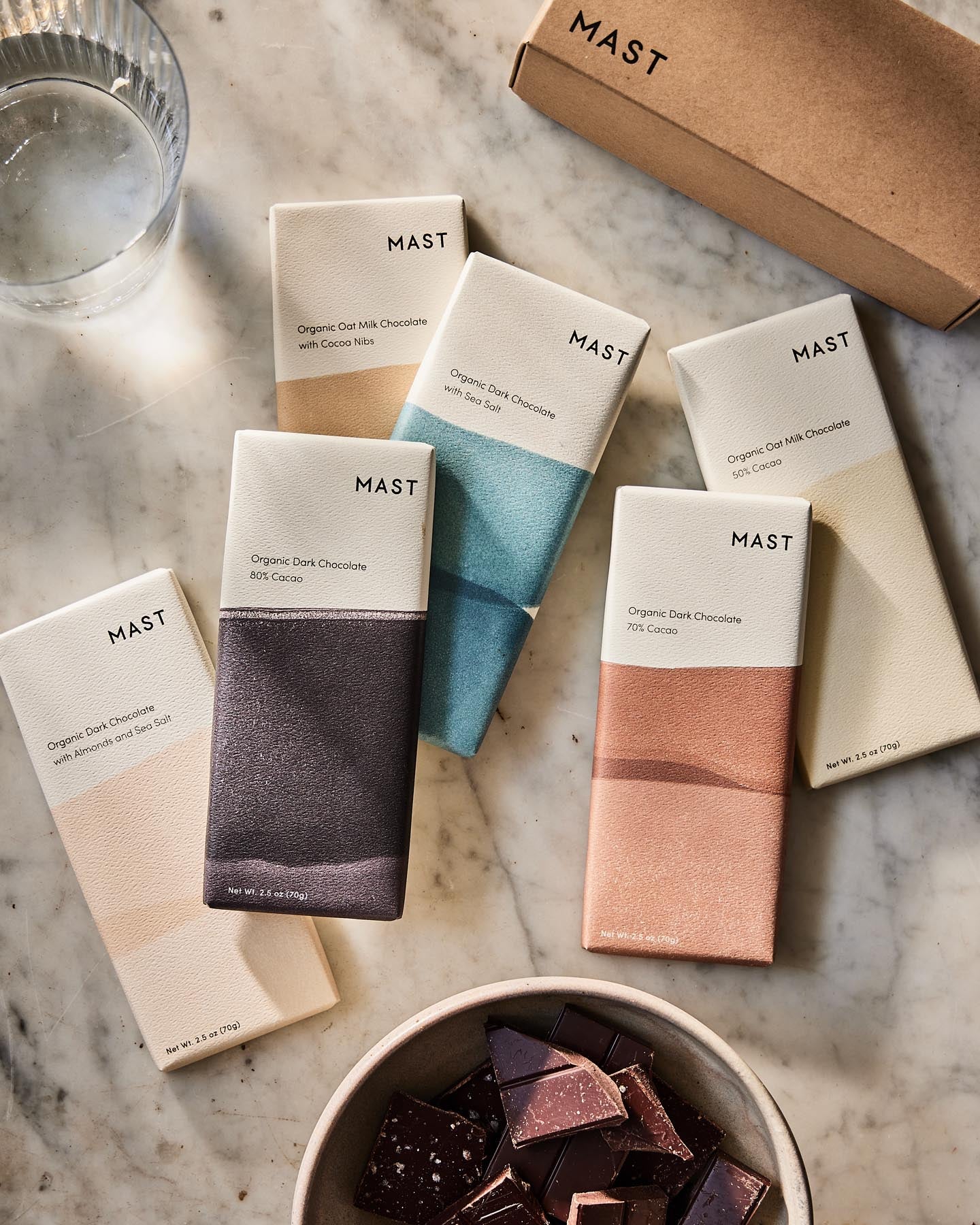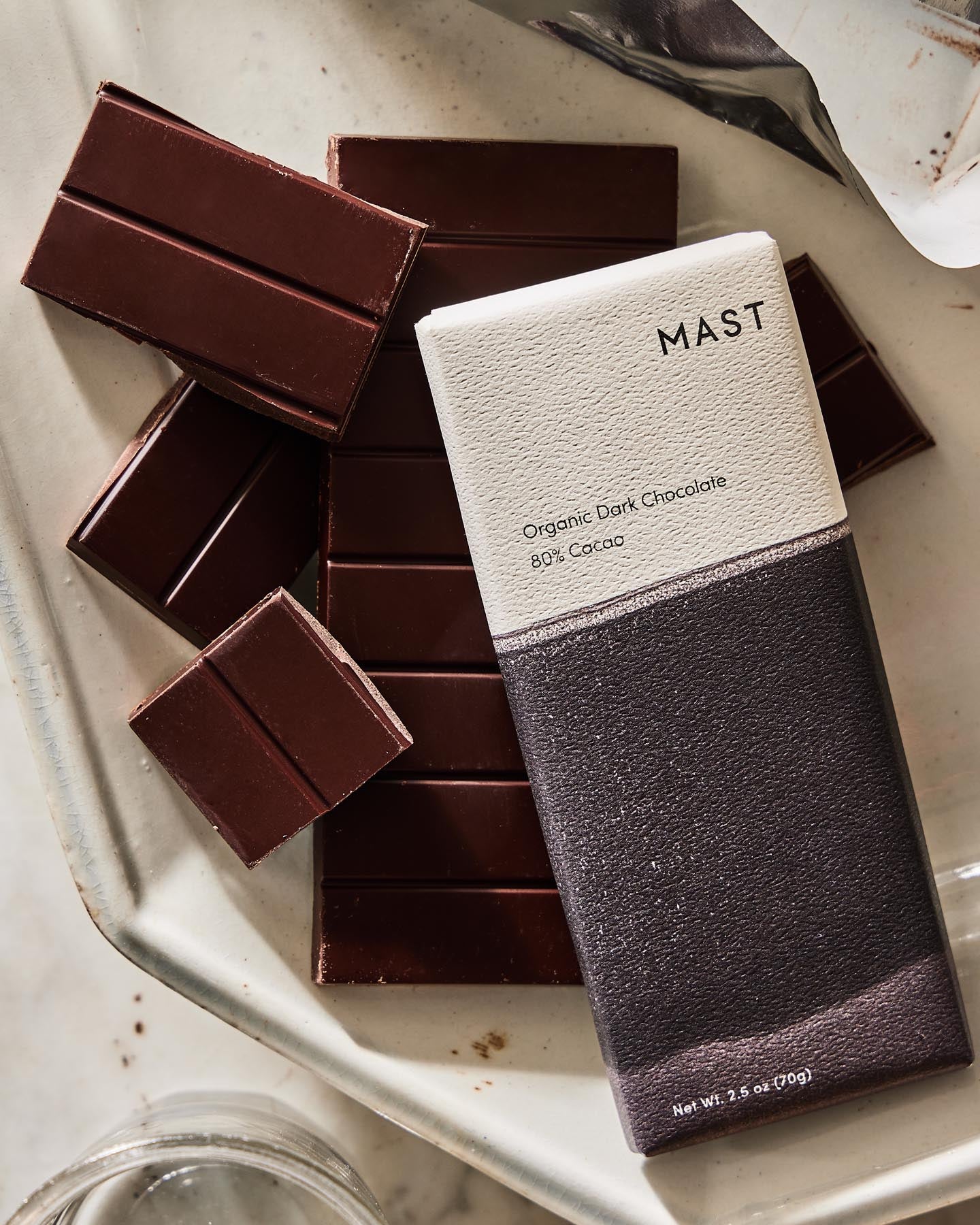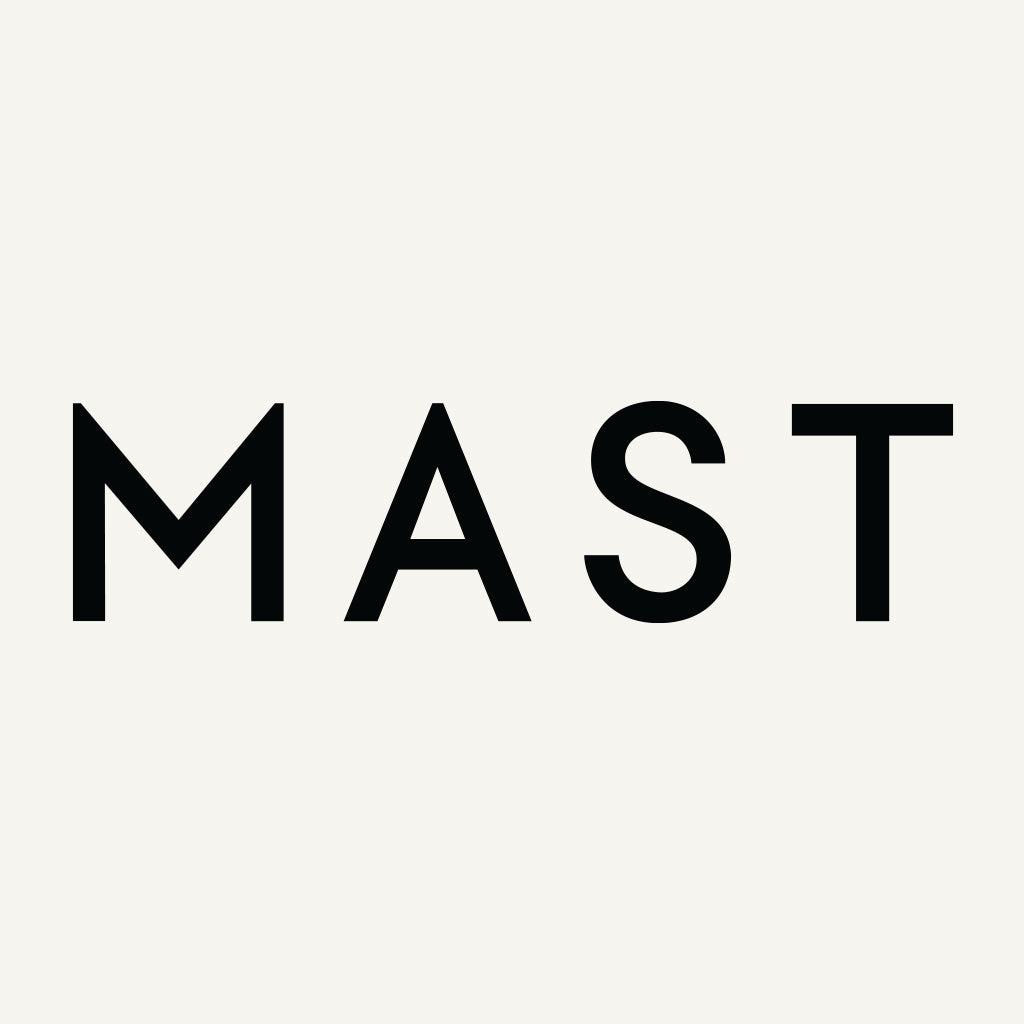Making Chocolate
In conversation with Alex Whitmore
During an early-aughts trip to Oaxaca, Mexico, Alex Whitmore first tasted the chocolate that changed his life. It was rustic and gritty—nothing like the European-style chocolate that was popular in the United States at the time. He learned that this compelling texture was achieved using stone mills, so he decided to bring some home with him and introduce this Mexican-style chocolate to his fellow Americans.
In 2005, Alex officially launched Taza Chocolate with his wife Kathleen Fulton. The duo has been crafting stone-ground chocolate in their Somerville, Massachusetts factory ever since. “We make chocolate all the way from cocoa beans to the finished consumer chocolate product,” he says. “We focus on really unique, artisanal production processes, and everything we make is certified organic and dairy free.”
This commitment to making organic chocolate is one of the reasons we chose Taza Chocolate to be our co-manufacturer, now that we’ve decided not to rebuild our own factory. We also admire Alex and Kathleen’s ethical cocoa sourcing practice, strong relationships with their farmer partners, and passion for improving the food system. Here, Alex shares more about how he built his company, why Taza Chocolate is so special, and what he envisions for the future.

Shop Mast Chocolate. Photo by Kate S Jordan
Mast Journal: How did you decide to start a chocolate company?
Alex Whitmore: I was working for a car rental company called Zipcar. I was riding my bike around, taking care of the cars, and managing the fleet. While I was doing that, I was really inspired by the founder, Robin Chase, who just did something totally audacious by starting some car company in Cambridge, Massachusetts and building it to be incredibly sizable and eventually getting acquired by Avis. I wasn't an early stockholder or anything. I was too young and naive, but I was really inspired by the audacity of her entrepreneurial efforts. I decided I wanted to do something that I could be proud of, that I could build and call my own. So I decided to start a chocolate company. I really didn't know why. It just seemed like it might be a good idea.
MJ: Your instincts were right! How did you actually go about creating Taza Chocolate?
AW: When I decided that I wanted to build something, the original idea was for a chocolate cafe, so I traveled throughout southern Mexico to learn more about drinking chocolates. I was an anthropology major in college and I was just fascinated with where chocolate came from and how it was originally consumed, which was as a drink. That's actually why our company is called Taza Chocolate. It's a call out to the roots of chocolate as a beverage, taza de chocolate, which is a cup of chocolate.
During a trip I took to Oaxaca, I saw how they made chocolate using these really simple stone mills. I was like, ‘This is it. I’ve got to learn how this works and bring this back to the U.S.’ I wanted to make stone-ground artisan chocolate where I'm from and bring that to the community where I live. And so that's what I did. I ended up working with some molineros, or millers, in Oaxaca, who taught me how to make chocolate using these stone mills. I brought a bunch of them up here and started making chocolate. My wife and I leased the space here in 2006 and started expanding our operation. It’s just grown from there.
MJ: Amazing! How would you describe the style of chocolate you make?
AW: I would describe our style of chocolate as American craft chocolate. We really do a lot with texture and chocolate. And we're the only company that really does that. We make really rustic, stone-ground, Mexican-style chocolate that's really coarse and gritty and intensely flavored. We also make a more refined version of that, which we call our Amaze Bars. They're smoother, but they still have a texture to them. We also make totally smooth chocolate that is super refined and more appealing to people who like traditional European-style chocolate. We do all of those things right here in this facility.
MJ: Sounds delicious. Why are your Mexican-style chocolates offered in discs?
AW: It's really common for drinking chocolates to be formed in a disc in Mexico. So we wanted to bring something that was truly unique into the market in the U.S. And by making it a circular shape, it makes people realize that they're buying something that's not just another chocolate bar, because it's so rustic and textured and gritty. We really wanted to make sure people realized that when they’re purchasing it. When they're doing their shopping, we want them to know that they're buying something really different than a regular chocolate bar.
MJ: Got it! Does that mean your Mexican-style chocolate discs are meant to be made into a beverage?
AW: All of our Mexican-style chocolate discs can be prepared as a beverage. That being said, most of our consumers just eat the product. It's designed to be either eaten or consumed as a drink.

Shop Mast Chocolate. Photo by Kate S Jordan
MJ: And you also make chocolate snacks?
AW: Yeah, we also have a panning operation right here in the factory where we make chocolate-covered nuts, chocolate-covered espresso beans. My favorites are the dark chocolate-covered hazelnuts. Those are our most popular snacks.
MJ: Do you have a favorite Taza Chocolate product overall?
AW: I go through phases, but I'd say right now the Salted Almond disc is probably my favorite. I love that it has almonds ground into the chocolate mass, which you don't get from most chocolates. So it's got a lot of almonds ground into it. It has just the right amount of salt and sugar and ground cocoa beans. It's delicious.
MJ: Yum! Where do you source your ingredients from?
AW: The most important ingredient for us, of course, is our cocoa beans and we buy them directly. We're very proud to be purchasing cocoa directly from many producers, primarily in the Dominican Republic and Haiti. We're the first U.S. chocolate maker to import organic cocoa from Haiti, which we're proud of. We have a very big impact there in the north of the country, in and around Cap-Haitian. We also source cocoa beans from Ghana and Uganda in Africa.
We only buy directly from producers or producer groups, and we pay a very high price premium in exchange for specific quality. We're very picky about what the quality is, how the fermentation process is carried out, and what we're looking for in terms of flavor profile. So we have those direct relationships and we've been doing that since the very beginning and it's something we're very proud of. I'm very passionate about bringing more meaningful direct market access to cocoa farmers around the world. That's something that has extended beyond just what we do here at Taza Chocolate.
I actually started another company called Uncommon Cacao with a woman named Emily Stone, who really helped us build out some export operations in Belize and Guatemala, back when we were working with those origins years ago. Through that company, we had been working with the Mast brothers, selling them cocoa beans for years. The craft chocolate industry in the U.S. has really been an interesting and unique story. I've been there pretty much the whole time and been able to see lots of different brands come and go. Mast is one of those really unique brands that really has stood the test of time.
MJ: How did Taza Chocolate come to be Mast’s new co-manufacturer?
AW: I can't remember exactly when the Mast brothers started making chocolate in Williamsburg, but it was not that long after we started. We existed side by side in the marketplace somewhat as competitors, but not really. Our consumer is different than their consumer in a lot of ways. But we've spoken with them, we've known about them. We had them for a tour of our factory years and years ago, back when they were in their heyday in Brooklyn.
We hadn't communicated too much over the years, but very recently, when they had their big fire, they reached out to a number of people in the industry to try to think about how to proceed. They were thinking about not rebuilding their chocolate manufacturing operation. They reached out to a common friend of ours, a used equipment dealer named Jim Greenberg, and he gave them the idea to reach out to us and consider having us make their chocolate products. And that's exactly what happened. We have the right size operation, as well as the right kind of equipment to make the kind of chocolate that they want under the Mast brand. We also had the line capacity, so we decided to move forward and make their chocolate products for them.
MJ: That’s so exciting! Were you already doing other co-manufacturing? Or is Mast your first partner in this type of business relationship?
AW: We do private labels for some retailers, and then we also have done some co-manufacturing for other brands. So we do have experience co-manufacturing.
MJ: How much of your production is Taza Chocolate versus other brands’ chocolate?
AW: It's probably about 75 percent our brand and 25 percent private label and co-manufacturing.
MJ: And what made you want to do co-manufacturing? Why is it an attractive pursuit?
AW: As a manufacturer, it's very important that you keep the production line running consistently and you do everything you can to even out the demand so that you're always keeping your team with something to do and you have more regular, consistent asset utilization. Because as a manufacturer, we have a lot of equipment and a lot of space that we lease, and we have to keep it busy, otherwise we lose money. We like to have lots of different kinds of relationships to even out the demand throughout the year.
MJ: That makes sense! What is your favorite part about making chocolate?
AW: I think how difficult it is. Cocoa is a very complex ingredient, so there's always stuff to learn. There are a lot of challenges in the chocolate making process that make it extremely complex, generally. And there's a high barrier to entry in a lot of ways. I think once you catch the bug, it's hard to stop, at least for me.
MJ: Totally. And what do you envision for the future of Taza Chocolate?
AW: We're trying to have a bigger impact on the producers that we buy cocoa beans from. We want to be able to buy more from them, create a more successful company for our staff, and continue to make unique chocolate products that aren't otherwise available in the marketplace for our customers. We just want to continue growing modestly and hopefully make a more positive impact in the world and in the cocoa industry.
More from The Journal

For over 35 years, Beth’s Farm Kitchen has been crafting artisan jams, jellies, and chutneys using local Hudson Valley produce. The company was originally founded in 1981 by Beth Linskey in her Stu...
Read more
For the past 14 years, Bedford 2030 has been working to reduce greenhouse gas emissions and protect the earth’s natural resources in Westchester County and beyond. The nonprofit is dedicated to add...
Read more